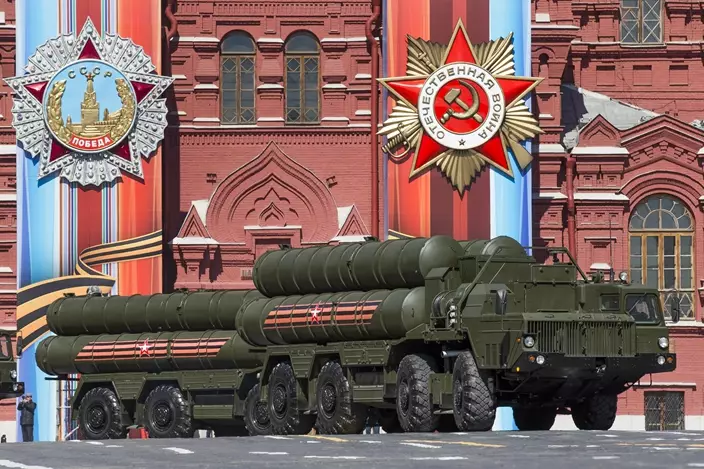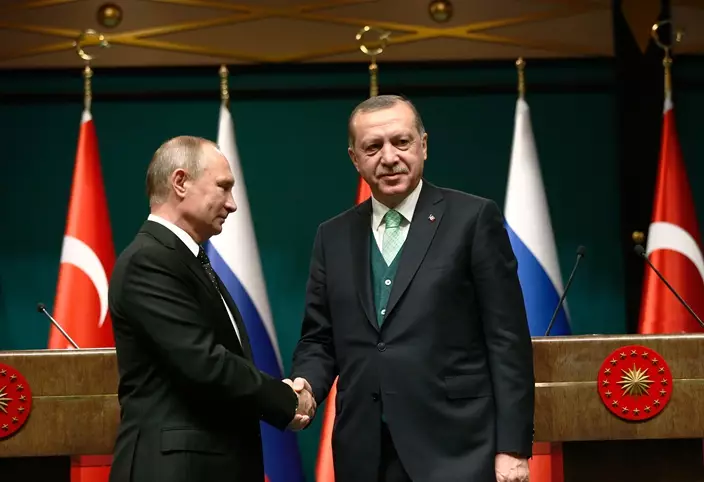Turkey has finalized a deal with Moscow for the purchase of Russia's S-400 anti-missile system, Turkish defense officials announced Friday, despite concerns voiced by some of the NATO member's allies.
The deal, which would make Turkey the first member of the military alliance to own Russia's most advanced air defense system, comes amid strengthening ties between Turkey and Russia and Ankara's deteriorating relations with the United States and other western countries.

FILE In this file photo taken on Sunday, May 7, 2017, Russian the S-400 air defense missile systems drive during a rehearsal for the Victory Day military parade in Red Square in Moscow, Russia. Turkey has finalized a deal with Moscow for the purchase of Russia's S-400 anti-missile system, Turkish defense officials announced Friday, Dec. 29, 2017 despite concerns voiced by some of the NATO member's allies. (AP Photo/Alexander Zemlianichenko, File)
The Turkish Defense Industries Undersecretariat said in a statement Friday that Turkey would buy at least one S-400 surface-to-air missile battery with the option of procuring a second battery. The delivery of the first battery was scheduled for the first quarter of 2020, the statement said.
The two countries on Friday also finalized a financial agreement for the project, under which part of the cost would be financed through a Russian loan, the Defense Industries body said, without revealing details of the deal.
Turkish media reported Friday that Turkey would purchase four S-400 units at a cost of $2.5 billion. Sergei Chemezov, head of Russia's state-controlled Rostech corporation, also told the business daily Kommersant in an interview published Wednesday that the contract was worth $2.5 billion and that a Russian loan would account for 55 percent of the sum.
Chemezov said Turkey would buy four batteries and that the first deliveries would start in March 2020, according to Kommersant.
"It's the first NATO country to purchase our most advanced S-400 system," he said.
The reason for the discrepancy over the number of batteries Russia would supply Turkey was not immediately clear. The Defense Industries body would not disclose the cost of the project or other details, citing "principles of secrecy" agreed to by the two countries.
The S-400 has a range of up to 400 kilometers and can simultaneously engage multiple targets. It's capable of shooting down ballistic missile warheads along with aircraft and cruise missiles.
Russia deployed the S-400s to its base in Syria to deter Turkey when the two nations were on the verge of conflict after a Turkish jet downed a Russian bomber on the Syrian border in November 2015.

FILE - In this Monday, Dec. 11, 2017 file photo, Turkey's President Recep Tayyip Erdogan, right, shakes hands with Russia's President Vladimir Putin, left, following their joint news statement after their meeting at the Presidential Palace in Ankara, Turkey. NATO-member Turkey has finalized a deal with Moscow to purchase a Russian-made anti-missile system. Under the deal announced by Turkish defense officials on Friday, Dec. 29, 2017. Turkey would buy at least one S-400 surface-to-air missile battery with the option of procuring a second battery. The deal would make Turkey the first NATO member to own Russia’s most advanced air defense system and, comes amid Ankara’s deteriorating relations with the United States and other western countries. (AP Photo/Burhan Ozbilici, File)
Turkish President Recep Tayyip Erdogan announced in September that Turkey had signed a deal to buy the Russian system and made a down payment, drawing concerns from some of Turkey's NATO allies.
Some NATO countries have expressed worries that the S-400 system is not compatible with the alliance's weapons systems.
The Defense Industries agency said the Russian system would be operated under the full control of the Turkish military and "in an independent manner, without any links to any outside elements."
"The system's operation, management, and systems recognizing friends and foes will be undertaken through national means," the Defense Industries body said.
BRUSSELS (AP) — Germany’s top diplomat on Friday accused Russian agents of “intolerable” hacking of Chancellor Olaf Scholz’s party and other sensitive targets, and was joined by NATO and fellow European countries in warning that Russia’s cyberespionage would have consequences.
Relations between Russia and Germany were already tense, with Germany providing military support to Ukraine in its ongoing war with Russia.
German Foreign Minister Annalena Baerbock said Russian state hackers were behind the hacking of emails of the Social Democrats, the leading party in the governing coalition. Officials said they did so by exploiting Microsoft Outlook.
The German Interior Ministry said in a statement that the hacking campaign began at least as early as March 2022 — a month after Russia's full-scale invasion of Ukraine — with emails at Social Democrat party headquarters accessed beginning that December. It said German companies, including in the defense and aerospace sectors, as well as targets related to the war were also a focus.
The statement said international efforts led by the FBI shut down in late January a botnet of compromised network devices used by the Russian hackers — known as APT28 or Fancy Bear — in the cyberespionage scheme.
“Russian state hackers attacked Germany in cyberspace,” Baerbock said at a news conference in the Australian city of Adelaide. She attributed the hack to a unit of Russia's GRU military intelligence unit.
“This is absolutely intolerable and unacceptable and will have consequences,” she said, without specifying what they might be.
The Council of the EU and the Czech Foreign Ministry said Czechia's institutions have also been targeted by the same group. Both German and Czech officials said the GRU hackers leveraged a previously unknown vulnerability in Microsoft Outlook.
In a statement by the EU’s top diplomat, Josep Borrell, the bloc’s nations said they “strongly condemn the malicious cyber campaign" by Fancy Bear "against Germany and Czechia.”
The EU noted that it had previously imposed sanctions on individuals and entities associated with the group for targeting the German parliament in 2015. It said it will not tolerate the continuation of such attacks, particularly with EU elections upcoming in June.
NATO accused Fancy Bear of targeting “other national governmental entities, critical infrastructure operators and other entities across the Alliance," including in Lithuania, Poland, Slovakia and Sweden.
“We are determined to employ the necessary capabilities in order to deter, defend against and counter the full spectrum of cyberthreats to support each other, including by considering coordinated responses,” said the North Atlantic Council, the principal political decision-making body within NATO.
Baerbock is visiting Australia, New Zealand and Fiji, with the trip focusing on security policy as China pushes for influence in the Pacific region.
“The defense cooperation between Germany and Australia is close and we would like to deepen it further and together expand it, because we are in a situation where we face similar threats,” said Baerbock, who is the first German foreign minister to visit Australia in 13 years.
Discussions between Baerbock and Australia counterpart Penny Wong centered on the conflict in Gaza. “I think we all understand that the only path out of this cycle of violence that we see in the Middle East at such great cost is one that ultimately ensures a two-state solution,” Wong said.
Associated Press Technology writer Frank Bajak in Boston, Karel Janicek in Prague, Stephen Graham in Berlin, Samuel Petrequin in Brussels and Foster Klug contributed to this report.

Germany's Minister for Foreign Affairs Annalena Baerbock, left, speaks with Lewis O'Brien, the oldest living Kaurna man, in Adelaide, Friday, May 3, 2024, during a ceremony to mark the return of four significant cultural heritage items to the Kaurna people from the collection of the Grassi Museum in Leipzig. (Michael Errey/Pool Photo via AP)

Germany's Foreign Minister Annalena Baerbock, center, poses with Lewis O'Brien, the oldest living Kaurna man, and Australian Foreign Minister Penny Wong, left, in Adelaide, Friday, May 3, 2024, during a ceremony to mark the return of four significant cultural heritage items to the Kaurna people from the collection of the Grassi Museum in Leipzig. (Michael Errey/Pool Photo via AP)

Germany's Foreign Minister Annalena Baerbock, left, and Australian Foreign Minister Penny Wong arrive for a news conference in Adelaide, Friday, May 3, 2024. (Michael Errey/Pool Photo via AP)

Germany's Foreign Minister Annalena Baerbock, left, and Australian Foreign Minister Penny Wong attend a news conference in Adelaide, Friday, May 3, 2024. (Michael Errey/Pool Photo via AP)

Germany's Foreign Minister Annalena Baerbock speaks in Adelaide, Friday, May 3, 2024, during a ceremony to mark the return of four significant cultural heritage items to the indigenous Kaurna people from the collection of the Grassi Museum in Leipzig. (Michael Errey/Pool Photo via AP)
















